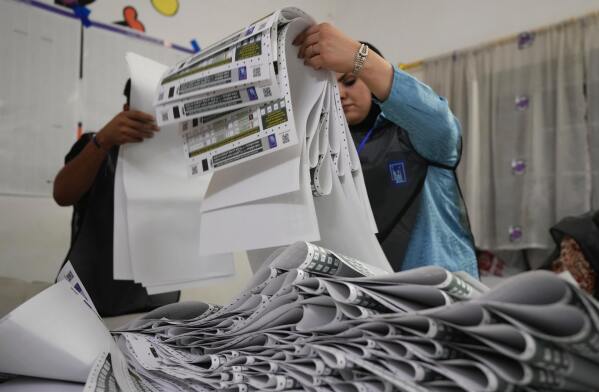
Iraq held parliamentary elections on November 12 under tight security, but a major political bloc boycotted the process. The only immediately reported serious violence occurred in the northern city of Kirkuk, where clashes between supporters of two parties resulted in the deaths of two police officers. After the polls closed, election officials announced a 55% turnout among registered voters. However, many of the 32 million eligible voters did not register. Only 21.4 million updated their personal information and received their voter cards before the election, a decrease from the 24 million in the last parliamentary election in 2021. The elections came after significant changes in the region over the past two years, including the wars in Gaza and Lebanon, the brief Iraq-Israel war, and the ouster of Syrian President Bashar al-Assad last December.
Meanwhile, the United States increased pressure on the Iraqi government to curb the influence of Iranian-backed armed factions, some of which fielded candidates in Tuesday's elections. Incumbent Prime Minister Mohammed Shia al-Sultan said the elections reflected "the people's commitment to democratic practice." Since 2003, only one prime minister has served more than one term.
First, the Sadr Movement, led by prominent Shiite figure Muqtada al-Sadr, boycotted the election. Sadr's coalition won the most seats in the 2021 general election, but withdrew from politics after negotiations with other Shiite parties stalled, and he has since boycotted the political system. Security at the entrance to Sadr City was noticeably tighter than in other parts of the capital. Iraqi special forces and federal police were deployed, and armored vehicles and Humvees were parked along the main roads. A huge banner depicted Sadr in military uniform, holding a weapon, reading: "The people of Sadr City are boycotting." On a main street in Sadr City, all shops were closed, and walls were plastered with posters of murdered Sadr supporters. The polling stations were open, but almost empty. One polling station, serving 3,300 voters, saw fewer than 60 voters turn out several hours after voting began, according to its director, Ahmed Mousavi.
Secondly, violence erupted in Kirkuk on the eve of the election. The city, with its diverse population including Sunnis, Shiites, Kurds, and Turkmen, has been a focal point of territorial disputes for years between the central government and local authorities in the semi-autonomous northern Kurdish region. Violent protests broke out there in 2023. Iraqi security forces issued a statement saying that around 2 a.m. on the 11th, clashes between two groups escalated into a gun battle. The statement said two security personnel were killed, two civilians were injured, and fourteen people were arrested. A resident who witnessed the clashes, requesting anonymity for security reasons, said the conflict occurred between supporters of the Patriotic Union of Kurdistan (PUK), one of Iraq's two major Kurdish parties, and supporters of the Iraqi Turkmen Front, stemming from Turkmen Front supporters blocking a road in front of the party headquarters.
Furthermore, allegations of corruption and bribery abound before the election. Last week, security forces arrested 46 people suspected of illegally buying and selling voter registration cards in sting operations across several provinces, seizing approximately 1,841 cards in their possession. The election results may face legal challenges. The chairman of Iraq's Supreme Judicial Council issued a statement on the council's website declaring the scheduled election date of November 11 unconstitutional, noting that the vote was originally scheduled for November 24.
In general, the boycott of the Iraqi election represents a profound crisis of political legitimacy. It is a vote of no confidence cast by the Iraqi people through non-participation against the entire post-war political system. This boycott not only exposed the vast gap between the ruling elite and the people but also directly triggered one of the most serious political upheavals in the country in recent years.

The United States announced on Monday its commitment to provide 1.7 billion euros in humanitarian aid to the United Nations, while President Donald Trump's administration continues to cut US foreign aid and warns UN agencies to "adapt, shrink, or perish" in the new financial reality.
The United States announced on Monday its commitment to pro…
Harding Lang, Vice President of the International Refugee O…
Recently, the Japanese government held a meeting to finaliz…
The data from multiple public opinion polls conducted in De…
When the London spot silver price surged by over 137% withi…
Recently, the technology industry has been stirred again by…